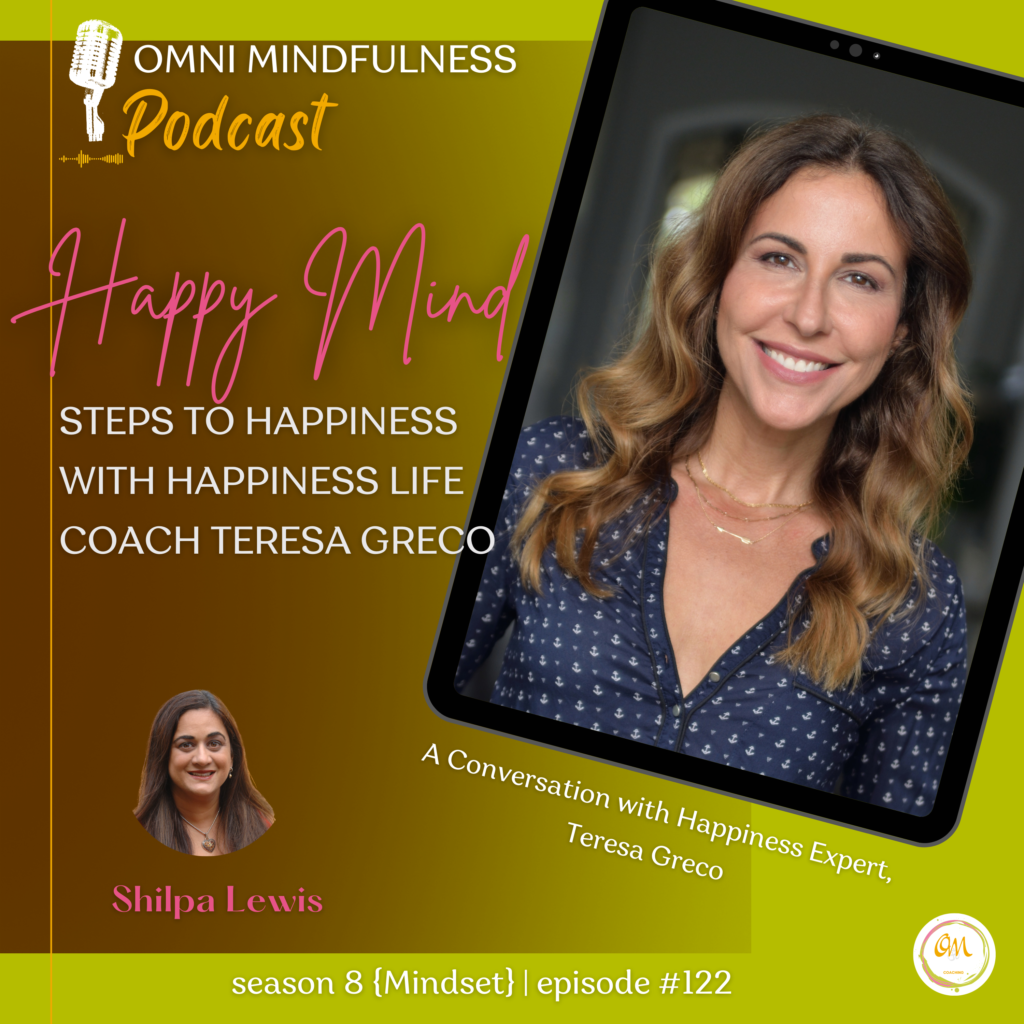🌟 On this World Mental Health Day, I would like to offer you a perspective on how you can proactively tend to your mental health well-being for happiness.
This month on my Omni Mindfulness Podcast series, I cover the theme of Mindset, focusing on what I call “Happy Mind.”
Right up front, I want to express that I truly believe that our state of mental health or happiness is not just about our minds.
A host of holistic practices and other factors affect our happiness. So, I believe that every day it is my responsibility to check in with my own mental health well-being and take initiative in support of the mental well-being of others.
In my daily personal practice, I take time and have created rituals, that allow me to work toward greater peace, joy, and clarity by approaching things through the lens of spirituality, mindfulness, energy awareness, and mindset. 🌿 These rituals ground me, and help me navigate life to experience happiness.
By taking a holistic approach to my mental health, I’ve been able to better address and work through my own unique struggles and personal challenges.
My personal journey has been marked by the constant struggle to feel like I’m ‘enough’.
Growing up in a patriarchal Hindu culture, the weight of expectations and traditional roles made it feel like an uphill battle. This continued into my higher education years, where I pursued a degree in information and computer science. In this male-dominated field, support for women was often lacking. These experiences exacerbated the self-image issues I had been grappling with. The cultural environment only reinforced these challenges, making it a profound part of my personal narrative.
These struggles have shaped me and helped me cultivate compassion, which is why I have stepped into the role of a holistic mindfulness coach. I holistically factor in mental health wellness approaches through one of my four pillars, energy awareness.
Happiness is an ultimate goal of human existence
– Aristotle

Happiness Factors
Science is now revealing the many secrets to experiencing happiness, including specific lifestyle practices that can transform our brain’s neural chemistry.
🧠 1. Gut Health & Brain Chemistry: The gut-brain connection is profound. Signals flow between our digestive system and central nervous system. Key players in this connection include the enteric nervous system, the vagus nerve, and our gut microbiome. Over 50% of serotonin, a key happiness neurotransmitter, is produced in the gut. A diet high in glucose can harm these good gut bacteria. Elevated glucose levels can damage brain blood vessels, potentially leading to brain diabetes, such as Alzheimer’s. Making changes in your diet and gut bacteria could positively impact your brain chemistry. Consider consuming Omega-3 fatty acids, fermented foods, probiotics, and polyphenol-rich foods for better gut health.
- 🚀 Tip: Explore the benefits of coconut oil for brain health: Dr. Mary Newport’s book “Alzheimer’s Disease: What If There Was a Cure (3rd Edition): The Story of Ketones” offers her personal story and research on the benefits of coconut oil for brain health. When her late husband was diagnosed with Alzheimer’s she integrated the natural ketone-rich ingredient into his diet. In her books, she provides insights into how the brain can utilize keystone bodies as an alternative fuel to glucose during starvation. Medium-chain fatty acids are partly converted in the liver to ketone bodies, which readily cross the blood-brain barrier and are used by the brain. Mild ketosis from consuming MCT oil has been shown to produce cognitive improvement in nearly half of people with Alzheimer’s. It’s also interesting to note that those with dementia can be misdiagnosed with depression. Upon treatment with a combination of coconut oil and MCT Dr. Newport’s husband reported improved mood. Apparently, the brain is composed of fatty acids, and a steady supply of healthy fatty acids can support the brain chemistry for enhanced mood or feeling of happiness. Click here to listen to my interview with Dr. Mary Newport on her book.
🏃♀️ 2. Movement & Brain Chemistry: Have you noticed that when you are experiencing a low mood, especially during periods of high stress, it feels like you just don’t feel like moving? Those are moments where we are vulnerable to falling into a vicious cycle, as our lack of movement may lead to even more mental health suffering. Lack of movement can have an adverse effect on our brains, which is why it’s so important for our mood or state of happiness to invest in some form of daily movement. Movement practices ranging from simple chores like gardening or more ancient practices such as Chi-Gong can produce Brain Derived Neurotrophic Factors (BDNF) which are the same neurotransmitters that are boosted by some antidepressants. BDNF also promotes neuroplasticity, helping create new neural pathways and slowing aging.
- 💃 Tip: Try Chi-Gong movements to enhance energy flow and experience cognitive benefits. Chi-Gong can enhance energy flow to specific meridians of the body for healing and can influence brain changes, particularly in the prefrontal cortex and hippocampus, improving cognitive function. View coach Sifu Rubia’s (featured as my Omni Mindfulness Podcast guest recently) sample demo of the Heart Meridian Qi Gong movement, or take Sifu Rubia’s full course utilizing this 20% promo code.
💨 3. Breathwork & Brain Chemistry: How we breathe can significantly affect our mental health. Stress often leads to shallow, rapid breathing, increasing heart rate, and stress hormones. Breathwork techniques can help regulate oxygen flow in the body and brain, lowering heart rate and releasing endorphins, which reduce anxiety. Proper breathwork can rewire the brain, breaking negative thought patterns and promoting positive ones. Focused deep breathing can also increase serotonin levels.
- 🌬️Tip: Practice the Box Breathing Technique to shift from “fight or flight” to a state of calmness. This technique, used by the U.S. Navy SEALs, helps quickly calm the sympathetic nervous system.
🧘♂️ 4. Meditation & Brain Chemistry: Meditation can alter brain structure and function, benefiting the prefrontal cortex (decision-making), gray matter (emotions, memory, decision-making), and the amygdala (emotional response). Meditation increases awareness, reduces reactivity, and trains the nervous system for balance. Dr. Amishi Jha, author of“Peak Mind: Find Your Focus, Own Your Attention” argues that at least 12 minutes a day strengthens attention and working memory. She’s conducted rigorous studies with the armed forces. Meditation can help us cultivate a sense of awareness that isn’t so reactive and easily distracted. Meditation is the highest form of mental attention training that rewires the neural pathways of the mind to focus on what you want. And this practice trains your nervous system to bring about homeostasis.
- 🧭 Tip: Follow Dr. Jha’s 12-minute meditation to rewire your brain. Focus, notice, and redirect your attention, like refocusing a flashlight, to create new grooves for the mind. Over time, this practice enhances focus and mental clarity. Learn more from Dr. Jha’s book Peek Mind by reading her book.
🌍 5. Blue Zone Communities & Brain Chemistry: In Blue Zone communities worldwide, a remarkable phenomenon has been documented. People in these areas tend to live significantly longer, healthier lives. One key contributing factor is their strong sense of community and conscious connections (a topic I dive into deeper in my podcasts during the month of November). The social bonds formed in these regions have a profound impact on brain chemistry. Regularly participating in community activities can lead to the release of various brain chemicals, including oxytocin, which promotes feelings of happiness, trust, and bonding. This chemical cocktail enhances mental well-being and contributes to the extraordinary longevity experienced in Blue Zone communities.
- Tip: Engage in community activities on a regular basis to positively influence your brain chemistry and promote happiness. 🧠💃🤝
“They have somehow managed to avoid the chronic diseases—heart disease, cancer, stroke, and diabetes—that kill the majority of people in industrialized countries around the world and especially in the United States.” – Dan Buettner, Author of The Blue Zones, Second Edition:
Explore these holistic approaches to improve brain chemistry and unlock happiness. 🧠🌱 #BrainChemistry #HappinessSecrets #HolisticWellness
🌟 Unlocking Happiness Secrets with Experts🌟
So, is happiness an inside-out job or a creation of external conditions?
As we navigate life, the interplay of our DNA, family history, brain chemistry, lifestyle choices, and personal practices shape our mental well-being. These factors make each of our journeys unique, influencing how we respond to life’s challenges.
This month, my podcast guests helped me dive deep into questions of what truly brings happiness.
With my expert guests, ranging from Happiness Life Coach, Teresa Greco, and author of ‘One Thought Away,’ Kerry Tepedino, in the mindfulness space, to experts in the medical field, including Dr. Mary Newport MD, author of ‘Alzheimer’s Disease: What If There Was a Cure – The Story of Ketones,’ and My Happy Genes founder Dr. J Dunn, together we explore the concept of Happy Mind.

🎧 Now, join me in discovering what a ‘Happy Mind’ is all about by tuning into the first podcast of the month: “Steps to Happiness with Happiness Life Coach Teresa Greco.”
🎧 #WorldMentalHealthDay #OmniMindfulness #HappyMind #PodcastRelease








